How to plant own root roses for long lasting success
I know soil prep is key to any success in the garden. I could use some advice on how to plant own root roses. Size of hole, what amendments, to fertilize or not, to mulch or not? How deep to plant? Remove foliage or keep it.
Comments (24)
gryhwk2330
10 years agoHi GWIolo
I'm new at this too but I'll throw my two cents in...
I dig a relatively deep hole and dump half a bag of composted cow manure in the hole. Then I plant the rose (usually bands) and fill in with a mixture of half composted cow manure and top soil. After that I water it well and cover it with 3-4 inches of mulch. Whatever is left above the mulch gets cut down to about six inches.
After that I basically just water when needed. After a couple of months I start fertilizing it with a time release fertilizer (Bayer) every six weeks or so and let nature do the rest.
This has worked on my bands so far and every one of them has sent up new canes within a month or so and has started blooming.
Good Luck!
KerryLynn-in-TX-Z8b- Austin Area/Hill Country
10 years agoHi,
I am not experienced planting own root bands but many suggest growing them in 1 gallon pots until they establish strong roots ( they are at the bottom of the pot); then the rose can be transplanted in the garden soil. You may want to check out strawberryhill and roseseek's posts as they have a lot of information regarding the importance of soil, and planting the proper roses in the right place respectively. Many of the members are very experienced and insightful in many respects. Ingrid, portlandmysteryrose, Hooverb, are among many who have beautiful gardens and that "touch" in knowing how to create beauty. One recent post you may want to read was started by me and is in the antiques thread from a couple of days ago regarding heat tolerant OGR's and pink OGR's. You may want to also seek gardeners on the forum who garden in your zone/area.
Lynn
This post was edited by desertgarden561 on Mon, Sep 30, 13 at 19:09
Related Professionals
Danbury Landscape Architects & Landscape Designers · Accokeek Landscape Architects & Landscape Designers · Chelmsford Landscape Contractors · Englewood Landscape Contractors · Fort Wayne Landscape Contractors · Mount Kisco Landscape Contractors · National City Landscape Contractors · Salem Landscape Contractors · Tigard Landscape Contractors · West Orange Landscape Contractors · Irvington Landscape Contractors · New Carrollton Landscape Contractors · Glendora Swimming Pool Builders · Carmel Siding & Exteriors · Ft Washington Siding & Exteriorsmichaelg
10 years agoModern advice from professional horticulturalists is not to prepare amended holes, but to amend the whole planting area evenly if that is needed. Usually 10" is deep enough. Heavily amended holes interrupt the natural movement of water and roots and can lead to water-logging or dry spots. Excessive use of organic matter leads to shrinkage, as Lyn says above. Also wild roses generally are not particularly adapted to mucky soils.
My advice would be to get a soil test through your county extension agent. Adjust the pH if needed. Avoid adding nutrients that are already abundant in the soil. (Too much of anything is harmful.)
If the soil is very sandy, add 1-2" of clay in the form of plain kitty litter. Unless organic matter is already high, dig in 2" of manure or 3" of compost. If the soil is heavy clay with poor drainage, raise the bed 4-6" above the surrounding grade. Nuggets of expanded clay (Turface) or slate are good for adding volume. To prevent long-lasting compaction, do not work or step on heavy soils when they are wet.
dublinbay z6 (KS)
10 years agoUnless you need to "correct" for some specific problem with your soil (Lyn certainly has specific problems she must address, for instance), I wouldn't worry a lot about it. Here's what I have been doing for years, and my roses have had no problems growing in my gardens.
If your questions are about planting tiny little "bands," ignore everything I say here. I've never planted a band, nor do I ever intend to do it in the future--so I know nothing about bands--except that some posters plant them directly in the garden as they would any other plant and have no problem with them.
If you are talking about a reasonably developed own root rose, such as you might get from Roses Unlimited or Chamblees (my favorite nurseries)--arriving in a pot and often already putting out a bloom or two--then this is what I do.
First, before the plant arrives, I dig up the entire bed, not just a hole for the rose--much better absorption and drainage as a result.
Next, I dig a fairly big hole--making sure there is no hard clay layer about a foot down--a problem with soils in my area. If I encounter that clay layer, I break it up. Then I mix at least a couple shovelfuls of humus/manure (from bag from Home Depot) into that clay mixed with garden soil mixture.
Then, carefully set the rootball of the rose so that the top of it is slightly higher than the surface of the garden and add soil around it (mostly garden soil, but there might be a bit of humus/manure mixed in).
Next, water thoroughly and deeply. As the water soaks in, it will draw the soil and the plant a bit downward also, so add a bit more soil to level out the top of the rootball even with the garden level.
Water it regularly (but don't drown it) for about a month to 6 weeks, at which point it should bloom a bit.
After the bloom is finished, give the rose its first feeding, but perhaps on the light side. I use either RoseTone (or Plant-Tone) or a regular fertilizer that is "balanced," like 10-10-10, or a timed-release fertilizer which should last for at least several months.
Oh, yes--add mulch around the rose but keep it a few inches away from the rose stem.
I try to keep the whole process as simple as possible--which can be done if you start with decent soil already in the garden.
I must confess that if I had to fuss over my soil like some gardeners do, I probably would not garden very much. But, each to his/her own, I guess.
Kate
nickl
10 years agoHi michaelg:
I agree with you - mostly.
My only small issue is adding clay material to sandy soil. It's been noted by many soil experts that this just doesn't work.
Personally, we found when we were establishing a vegetable garden many years ago, that even a heavy application of Turface to our extremely sandy soil did not change the soil type in any measurable way - based on before and after samples submitted for soil testing to our State testing lab.
When we subsequently worked on the rose garden area (= same soil), we just didn't bother with it.
However, we are in total agreement about adding organic matter over a wide area (not just in the planting holes) to any soil that is poor in it.
This post was edited by nickl on Wed, Jul 10, 13 at 12:19
subk3
10 years agoI pretty much do what Michael suggests except I have clay soil that has tested really well, so I don't add anything but composted horse manure. My main challenge here is soil compaction that restricts root growth and water movement.
One addition I would suggest though is advanced preparation. I dig 4-6" of compost 10-12" deep throughout the entirety of a new bed then let it sit. I get enough moisture here that a few months of that compost integrating into the soil and letting the food web get geared up leaves me with a better planting medium than if I dig, mix and plant all at the same time. I add nothing to the planting hole nor do I make it terribly big because at that point the whole bed is a really good consistency.
From that point I add composted horse manure/stall leavings (and sometime not as composted) only as a top dressing/mulch layer. In some spots I might add just enough pine bark fines over the top to make it more attractive, but the compost is the bulk of my mulch. (I have a never ending supply of horse poop! ;-) )
I only have young roses but, so far everyone seems pretty happy and the perennials (that I have more experience with) do really well. The more I learn and garden the more I believe it's about managing soil and not about managing plants.
michaelg
10 years agoNicki, we may have some misunderstanding between us. I suggested adding expanded clay or shale or slate to heavy clay soils, not to sandy soils. These expanded materials are hard, chunky, lightweight nuggets with pores that retain air and water. The clay type is fired at a high temperature so the nuggets never break down. The EarthKind people report good results from tilling 3" of the shale type into poorly drained clay soils to create slightly raised beds. I have not done it myself.
Then I suggested adding 10-12% clay in the form of kitty litter to sandy soils. I have done this myself with good results, as has Henry Kuska. There is also a research article about using it in potting mix that reported positive results. The KL will break down into very fine clay particles that retain water and nutrients.
You may be thinking about adding sand to break up clay soil, something that has been often recommended but that only makes things worse (unless you add 75% sand).
Let me add that I've noticed and appreciated your smart posts.
This post was edited by michaelg on Wed, Jul 10, 13 at 13:32
roseblush1
10 years agoYes, I do agree that adding mulch over a wide area is the best way to improve soil. Oh, wow ! do I agree.
Since I first started this garden I have been going out to the forest to gather mulch and mulching twice a year, which has improved the soil in this garden better anything else I could have done. btw ... I can't buy mulch in this town.
I have never killed a rose. I think they are tougher than I am, but I have learned a lot over the years. Michaelg was the first person who taught me the concept of a homogenized bed and understanding that roses don't put down tap roots helped me to connect the dots.
I did manage to get a guy up here with a large tiller, but he's already told me he's not coming back because he's worried about his equipment. Oh, well. Raised beds are out of the question for this garden, but may work very well in other gardens, but I can still use the concepts Michael taught.
As you can see from above, there are different approaches in how people grow roses. There are a lot of right ways to grow roses. When a rose is "happy", it seems to grow like a weed. If you are growing the wrong rose for your conditions, you'll will have to work a whole lot harder to keep the plant thriving and it will never feel as satisfactory as the roses that work in your conditions.
Learning about your soil, learning about how the plants grow, learning about which roses do best in your climate and soil type improve your chances of growing good and healthy roses. What is true in one garden is not always true in another.
I think the other most important thing you can do as you garden with your roses, is pass along what you have learned . I am grateful to all who have helped me along the way. I may still make mistakes, but at least they are different mistakes.
Smiles,
LynLynn-in-TX-Z8b- Austin Area/Hill Country
10 years agoI received own root bands from RVR today and here are some of their suggestions:
1. No granular or chemical fertilizer for the first year. They describe it as the single biggest cause of band failure or death.
2. Keep the plant moist but not soggy and water two times per day when it is really hot...90+ degrees. Place the bands in light shade or an area that receives morning sun
3. After two months, if they are placed in a larger pot instead of the ground, a time released fertilizer with micronutrients can be used,
4. Do not water heavily prior to planting as the soil may break away from the roots .
5. If retaining the band in the pot for a while, add time released pellets with micro nutrients, about 8-10 for a band and 24- 30 for a gallon.
Lynn
This post was edited by desertgarden561 on Wed, Jul 10, 13 at 20:39
catsrose
10 years agoI usually end up with more bands than I have prepared beds, and by the time I've got all the planned beds planted, I just want to finish up. So I wander around clutching the band(s) until inspiration hits. Then I dig a hole about 12" wide and deep, throw in several handfuls of compost, stick the band in, water it, stick in the name plate and walk away hoping I don't forget to water it later. Except for two or three that were planted in what has turned out to be weird soil spots, all of these have survived as nicely as those in prepared beds. Roses are tough.
rosefolly
10 years agoI have stopped digging deep holes. I find that if I do, the soil gradually settles and the roses sink in too deeply.
I pot my roses up into a gallon and grow them up a size. Then I plant them into the ground in a gopher basket. I water deeply, then water again, and spread a generous layer of compost on the surface. I don't fertilize until from 6 months to a year later, at which time I use something organic, often alfalfa meal.
I have a reasonably fertile soil in part of the garden. In the unfortunate part without good organic material in the soil, I mix compost in generously at planting time as well as put it on the top as a top dressing.
I usually put a wood chip mulch over the compost as a protective layer. By the way, it is important not to allow the wood chips to mix into the soil when digging a new hole for planting.
That's pretty much it.
Rosefolly
This post was edited by rosefolly on Wed, Jul 10, 13 at 23:11
gwlolo
Original Author10 years agoWhat a wonderful resource you all are. I have read all the responses several times. I think I totally get the amend the whole planting area bit. I also called our county extension and unfortunately, CA extension offices do not do a soil test. I have to find a private lab or see if I can do it reliably at home. My sense was that the home test kits are terribly error prone. We aim to have a natural organic garden and I am wary of amending or adding something that will not be good for the soil.
One question I had was - how is compost different from Manure? Don't they provide similar benefits? some of you have specified well rotted manure in the planting process.
gwlolo
Original Author10 years agoWhat a wonderful resource you all are. I have read all the responses several times. I think I totally get the amend the whole planting area bit. I also called our county extension and unfortunately, CA extension offices do not do a soil test. I have to find a private lab or see if I can do it reliably at home. My sense was that the home test kits are terribly error prone. We aim to have a natural organic garden and I am wary of amending or adding something that will not be good for the soil.
One question I had was - how is compost different from Manure? Don't they provide similar benefits? some of you have specified well rotted manure in the planting process.
catspa_NoCA_Z9_Sunset14
10 years agoGW, with all that ag in the Central Valley, there are multiple private soil-testing labs around. I've used the one listed below (in my time, it was patronized by budget-minded UC Davis grad students, being cheaper, then at least, than in-house testing) and found it satisfactory. Googling around, comparison-shopping among the soil labs shouldn't be too hard. Fees, instructions for how to collect and send samples, submittal forms -- on the website.
Here is a link that might be useful: A&L Western Labs
michaelg
10 years agoA big nay on the home test kits, although it is handy to have a meter or test strips to test pH. You'll need to use a private soil lab to check the nutrient levels. Sorry I didn't notice you were in California where the state testing service was discontinued long ago, maybe when Reagan was governor.
Manure vs homemade compost--any organic matter will eventually decay down to a small residue of syrupy black stuff called humic acids, and this is what has a long-term beneficial effect on the soil. As I understand it (subject to correction), manure, as opposed to veggie compost, is more thoroughly digested to begin with and so has a stronger effect on the soil per unit applied. Also it may have more nutrients, but that depends on how much leaching has occurred with either material. Well-rotted compost is fine if you have it, but use maybe twice as much as you would of manure.
catspa_NoCA_Z9_Sunset14
10 years agoYour second question: usually, compost is primarily decomposed plant material (plant material broken down by bacteria, fungi, et al.) and manure is primarily animal-digested plant material, i.e., animal dung. Let's ignore the phrase "green manure" for the time being... ;-) But, as michaelg says, it all ends up more or less the same thing (makes sense, having all started as plant material). Manure is the more dis-assembled form of plant material, has more available nitrogen.
But, home composters might throw manure into their compost pile mix to liven things up. "Soil amendment compost" derived from residential green waste might also contain decomposed animal materials (we are urged to throw bones and meat scraps into our "green bin", the contents of which are ground up at a composting facility). Commercial soil amendment products based on compost might also contain a small percentage of animal manure or other animal products: bat guano, chicken manure, feather meal, etc. So, "compost" products may in fact be a combination that also contains manure.
What's in a commercial product is always listed on the bag.
This post was edited by catspa on Thu, Jul 11, 13 at 14:54
catspa_NoCA_Z9_Sunset14
10 years agoAdded thought (as I was out digging compost into a new rose area), is that compost gives a greater boost to, and a more prolonged beneficial impact on, the organic matter content of your soil. Although eventually going to the same state as manure, it takes longer to break down and more is usually applied. While present, it makes soil less compacted and helps to increase water infiltration, water-holding capacity, nutrient retention, and gas exchange.
I tend to think of manure as more of a vehicle to increase nitrogen but compost as more of a way to improve the overall structure of the soil (though both do each to some extent).
subk3
10 years agoThe difference in compost and manure is how recently it came from the back end of an animal. ;-)
Compost is the what remains after the decomposition of organic matter. So manure is only one of a countless number of possible "ingredients." I compost my horses' stall waste and others their kitchen trash or their yard trimmings!
Usually horse manure or compost made from horse manure is made from a mix of the stall bedding material like sawdust. These two ingredients do very well to create the right balance of carbon and nitrogen needed for efficient composting.
Generally a good compost from horse manure is going to give you a NPK somewhere around 1.5-1.5-1.5. So not "strong" as a fertilizer, but considering the quantities that can be used it does make a difference. Personally, I think the advantages of good compost are as much the micronutrients and the humus that creates a superb soil tilth.
There are also several knowledgable rosarians who swear by putting fresh horse manure on their roses!
GardenWeb does have a composting forum with some good FAQs if you are interested in more info. There are participants whose enthusiasm for the subject easily rival the enthusiasm for rose here!!
jacqueline9CA
10 years agoIt sounds so basic, but I thought I would mention a problem a friend of mine had. She bought a band, & potted it up to a one gallon black nursery plastic pot. Then, since she knew that roses "needed 6 hours of direct sun every day" she put it on her back porch in the sun. Then, a few weeks later we had 3-4 days of 100 degree temps...
She called me yesterday in a panic wanting me to tell her why her rose looked as if it was dying, although the first 3 weeks it had been in the one gallon pot it had done well, put out new growth, etc. After listening to the symptoms and asking her some questions, I told her that I thought she had baked her rose. She said that she gave it water every day. I said OK, it didn't get baked, it got boiled. Nuff said -
Jackie
gwlolo
Original Author10 years agoSo it looks like there is no NPK difference in manure vs. compost. I have been composting for years but what I do is prettu elementary - browns + greens+ some moisture and a couple turns of compost crank and a few months later I have some brown rich smelling earth to use. I always figured that compost was mainly to improve the tilth and structure of the soil and not necessarily the nutritive value. But I have friends who swear by the quality of a really good composted manure like Double Doody.
That brings me to the question about feeding.
What organic feeds work? Alfalfa was mentioned. I have used bone meal and fish emulsion previously. Should I amend organically a few days before planting to basically let the microbial system establish before planting? Should I wait until I see some new growth after planting to feed it?
Thanks for the pointer to the soil lab. I will take care of that business.
Lynn-in-TX-Z8b- Austin Area/Hill Country
10 years agoOne thing I am fairly sure of is what organic feeds you use depends upon your soil; and things like soil alkalinity etc. Testing to determine what is already present in your soil can be very helpful. For example, our soil has a lot of gypsum, which breaks down into calcium and sulfur that is available for plants. The nutrient problems I have are a lack of phosphorus, iron, manganese, and zinc . The organics you use should address the problems that exist in your
soil. An easy way to test your calcium carbonate (calcium) is to take a tablespoon of your soil, add a teaspoon of vinegar, if it fizzles, the vinegar is reacting with the calcium carbonate by releasing carbon dioxide. If you do not hear anything, the levels could be low or present in another form.This post was edited by desertgarden561 on Thu, Jul 11, 13 at 20:23
jerijen
10 years agoFWIW, we have very few roses here which did NOT begin life as rooted cuttings or bands.
We do not have a very managed and immaculate garden. We fight Bermuda grass and any other sort of weed imaginable. Our water is very alkaline. Our "soil" is decomposed sandstone, devoid of any organic material, unless we add it ourselves.
We do not plant bands into the ground.
We pot them up to 1-G pots, and grow them up until roots show at the bottom of the pot. It is probable that we will pot up to 5G then, so that, when they go into the ground, they're pretty substantial plants, and that works for us.One other thing. Nothing planted in the ground here is likely to long survive. Gophers are everywhere. Roses and other plants, here, are planted in pots in the ground (with many added holes) or very substantial baskets. If that is not done, gophers WILL eventually eat the roots.
Jeri
dublinbay z6 (KS)
10 years agoOrganic food like RoseTone (or PlantTone) is usually a good choice. Has a little bit of everything in it--alfalfa, feathermeal, minerals, etc., plus the usual npk stuff.
Kate
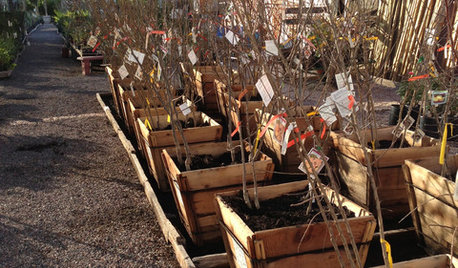
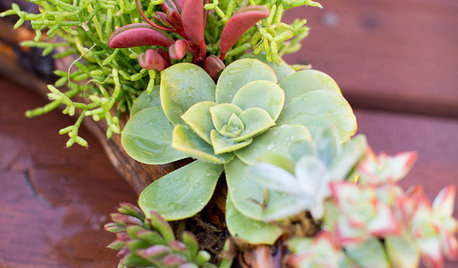
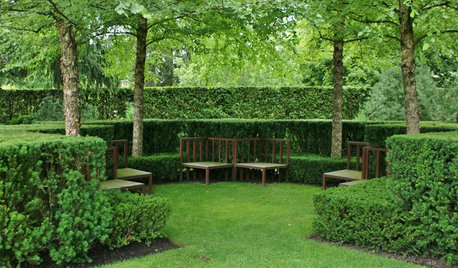

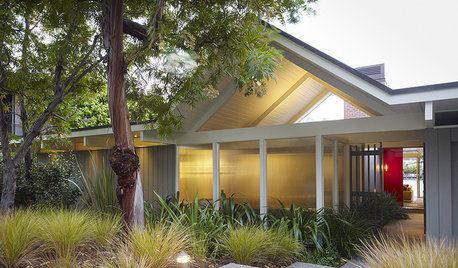

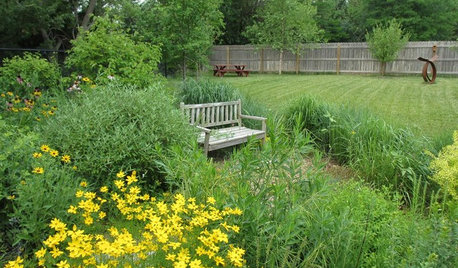
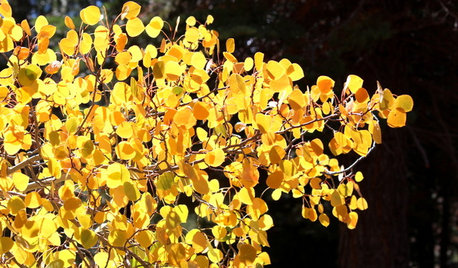

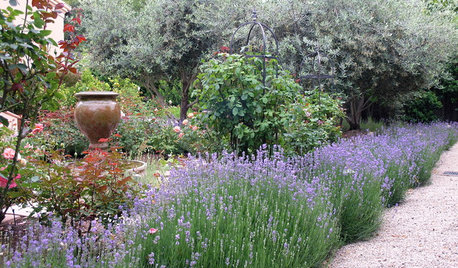










roseblush1